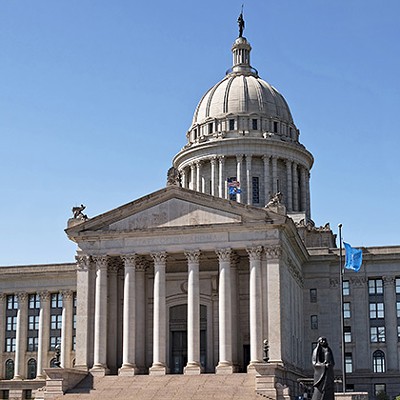A jury decided to award six Oklahomans $66 million based on a decades-old lawsuit brought against Shell Oil Co.
WINK AND A NOD
INFORMANT
COURT BRIEFS
A plot of 20 acres in Stephens County, about 80 miles southwest of Oklahoma City, is connected to global Shell Oil Co. A jury has ordered the company to pay the amount for failing to send royalty fees to landowners for more than a decade.
"Shell did not contest the actual amount owed," said the plaintiff's Oklahoma City attorney Randy Calvert. "By the time we got to trial, their only defense was we waited too long to sue. They were telling the jury, 'We know we owe the money, but we'd like you to let us keep it.'"
Shell's local attorney did not respond by press time; however, the company is expected to appeal the verdict.
From a technical standpoint, the case stretches all the way back to the Twenties. Oil drilling began in the area between Duncan and Ardmore, known as "Crews Lease," in 1927. Two decades later, Shell Oil took over the lease.
WINK AND A NOD
In 1972, Shell was given permission by the Oklahoma Corporation Commission to set up a new well in the area named "Brittain-Deep No. 2." This well would become the focal point of the lawsuit, in which the plaintiffs accuse Shell of underpaying royalties from the time the well was first drilled.
Shell sold all of its interest in the lease to Dallas-based Maynard Oil Co. in 1985. Maynard was dismissed from the case after a settlement was reached. The Dallas company paid the plaintiffs in full for the amount due from the time Maynard operated the Crews Lease through the settlement date in 2001.
Maynard was acquired by Houston oil company Plantation Petroleum in 2002.
A year and half into Maynard's purchase of the lease, the new company questioned the royalty payments on the Brittain well. A year later, Shell informed Maynard records of payments did not exist.
"There was a wink and nod between Shell and Maynard," Calvert said. "When Maynard found out Shell had not been paying, Maynard decided they were not going to pay either."
Under the lease agreement, Shell would send monthly payment statements to the royalty owners, who were due an interest of 25 percent from the net profits. According to court documents, Shell had been sending accurate monthly statements for about 24 years. But the statements were undervalued during Shell's last 12 years of the lease, the plaintiffs contend.
INFORMANT
There is no telling how long the non-payments might have lasted if an informant had not revealed the situation to the landowners in 1994. Calvert said an independent land man told the property owners they might be owed money on the well. Land men negotiate details between property owners and exploration companies on drilling leases.
In 1995, the descendants of the original owners of the property, P.C. Dings and W.F. Daiber, filed suit against Shell. The descendants entitled to the property are Daiber's niece, Elizabeth Gardner; and Susan Maley and Nancy Hebble, who are the daughters of Daiber's nephew, Thomas Fuller. Gardner died in 2000. Dings' fortune was placed in a trust that was controlled by Edward Galt. When Galt died, that trust was handed to his three daughters.
"They were best friends," Calvert said of Galt and Dings. "Ed Galt was the trustee of the trust P.C. Dings set up to manage his oil and gas properties before his death. P.C. Dings had one daughter. After P.C. Dings' wife died, the daughter sold her interest in the trust to Ed Galt's wife."
The plaintiffs asked for $52 million in punitive damages, money juries award to punish the defendant. The jury in this case ordered Shell to pay $53.6 million. The plaintiffs were also awarded $13.2 million in actual damages. Shell will also have to pay attorney fees, which could run in the millions as well.
Calvert said the key to winning the case was the voluminous amount of documents Shell handed over that revealed the non-royalty payments.
"At every turn, (documents) showed the interest (owed to the plaintiffs)," Calvert said. "There was never any doubt. Shell knew we owned an interest.
"When they wrote to Maynard they did not have any royalty reports on that well, it was a slap in the face."
COURT BRIEFS
According to the court briefs, Shell's main argument against the lawsuit was it came well after the statute of limitations. Shell stated the clock on the statute started when the lease was sold to Maynard in 1985. The case was not filed for another 10 years.
"Shell said we should have known then," Calvert said. "We said, 'Know what?'"
Calvert said the whole situation might be the product of an accounting mistake, but he said that's no excuse.
"We know Shell found out," he said. "The question is why didn't they do the right thing." "Scott Cooper











